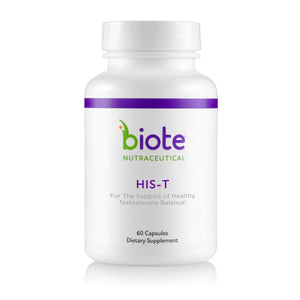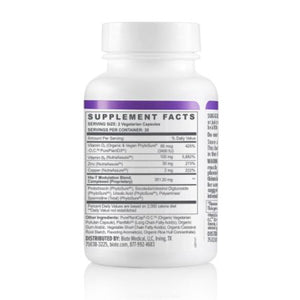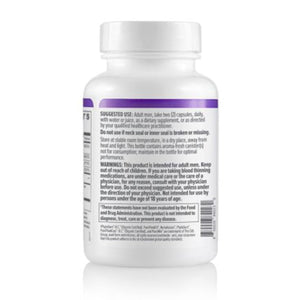Your Cart is Empty



Sale
BioTE HIS-T - Hormone Support - 30 Capsules
$75.00$87.95
BioTE HIS T - Hormone Support
Biote His-T is a naturally derived, optimally balanced, science-based combination of Pyridoxine (vitamin B,), Cholecalciferol (Vitamin D,), Zinc (Zn), Protodioscin, Secoisolariciresinol Diglucoside (SDG). Ursolic Acid, and Spermidine. This physician-grade formulation supports healthy testosterone balance and helps support healthy cortisol levels and nitric oxide production, which promotes vascular health, and overall health and longevity.
Most of the published literature in men suggests that healthy testosterone levels improve clinical outcomes, ie. body composition, bone mineral density, and does not increase prostate cancer. Therefore, maintaining a healthy testosterone balance is essential in men.
Supports Multi-Mechanistic Hormone Balance:
- Selective estrogen receptor modulation (SERM)
- Prolactin
- Aromatase
- Five-alpha reductase Luteinizing hormone
What are the main ingredients of Biote His-T?
Pyridoxine (Vitamin B)
Research suggests vitamin B supports healthy testosterone levels by modulating cortisol and prolactin. Both prolactin and cortisol decrease testosterone production. It has been suggested that vitamin B, significantly reduces prolactin levels, which reduces prolactin’s inhibitory effects on testosterone synthesis. Studies also show that vitamin B, may modulate elevated cortisol levels by inhibiting glucocorticoid receptors. This in turn, decreases cortisol receptor binding and its adverse effects on testosterone production.
Cholecalciferol (Vitamin D)
The available evidence in men indicates that vitamin D3, a prohormone, is associated with total and free testosterone levels, i.e., as vitamin D levels increase, so do total and free testosterone levels, and as vitamin D levels decrease, so does testosterone. Notably, in one study vitamin D3 supplementation resulted in significantly higher total and free testosterone levels in middle-aged men.
Zinc (Zn)
In addition to its immune-modulatory functions, zinc, an essential mineral, is a cofactor for luteinizing hormone (LH) synthesis, LH release, and testosterone production. Hence, zinc deficiency may impair LH synthesis and testosterone production. Zinc deficiency may also increase estrogen receptor expression. Zinc supplementation (30mg/d) in men with marginal zinc deficiency nearly doubled total testosterone levels. In addition, zinc inhibits 5-alpha reductase, the enzyme that converts testosterone to its more potent metabolite 5-alpha dihydrotestosterone (DHT). This inhibitory effect may be potentiated by vitamin B6.
Protodioscin
Protodioscin is a steroidal saponin chemical class isolated phytochemical that is principally found in terrestrial plants, such as Melanthiaceae, Zygophyllaceae, and Fabaceae families, which have been used for centuries in both Chinese and Indian medicine. Protodioscin, in well-controlled clinical trials, increased total testosterone levels.
Secoisolariciresinol Diglucoside (SDG)
The lignan chemical class phytochemical secoisolariciresinol diglucoside (SDG) has been shown to inhibit aromatase, the enzyme that converts testosterone to estradiol, which decreases testosterone levels. Research suggests that enterolactone, SDG’s primary metabolite, is a potent 5-alpha reductase inhibitor. The latter maintains testosterone levels by preventing testosterone metabolism to dihydrotestosterone (DHT). Studies have shown that SDG, especially in high concentrations, can decrease cortisol levels in response to mental stress. In one in vivo study, high-dose SDG eliminated the stress-induced cortisol increase.
Cortisol and testosterone have an inverse relationship. As cortisol increases, testosterone production decreases. Therefore, supporting healthy cortisol levels helps support healthy testosterone balance. In addition, lignan chemical class phytochemicals, including SDG, function as selective estrogen receptor modulators (SERMs), which, in men, support healthy hormone-sensitive prostate tissue.
Ursolic Acid
Ursolic acid, a pentacyclic triterpenoid chemical class phytochemical, upregulates endothelial nitric oxide synthase (eNOS), an enzyme located in arterial wall endothelial cells. Ursolic acid also helps uncoupling endothelial nitric oxide (eNOS) from potent free radicals such as superoxide (O2-), thus improving endothelial cell nitric oxide synthase (eNOS) availability. Endothelial nitric oxide synthase (eNOS) availability supports endothelial nitric oxide (NO) production, which is important for healthy vascular function. Both the former and latter may decrease with age.
Ursolic acid was found to be a potent phosphodiesterase type 5 (PDE5) inhibitor that approached vardenafil’s (Levitra®) PDE5 inhibitory activity. Ursolic acid has also been shown to support prostate health. Ursolic acid reduces dihydrotestosterone (DHT) in the serum and in the prostate as effectively asthe pharmaceutical drug finasteride (Proscar®). Finasteride is FDA-approved and prescribed for benign prostatic hypertrophy (BPH).
Spermidine
Spermidine, a polyamine chemical class compound, is a natural substance produced by every living cell, whether plant or animal. Spermidine is the most abundant polyamine that is required for life. However, spermidine decreases with age. High dietary intake of spermidine and related polyamines are associated with improved health and longevity, thus considered a true “anti-aging” molecule. The effects are like caloric restriction, which is a robust and consistent anti-aging modality. Importantly, testosterone supports increased spermidine synthesis and reduced testosterone levels are associated with lower spermidine levels. Research has shown that spermidine supplementation increased men’s testosterone levels approximately 50%, along with a decrease in cortisol levels approximating 50%.
Suggested Use: Take 2 capsules daily in the morning with a light meal or snack, as a dietary supplement, or as your healthcare provider recommends.
Does Not Contain: Soy, Dairy, Gluten, Wheat, Egg, Corn, Tree Nuts, Peanuts, Shellfish, Fish, Sesame, Artificial Colorings or Flavorings.
These statements have not been evaluated by the Food and Drug Administration. This product is not intended to diagnose, treat, cure, or prevent any disease.



